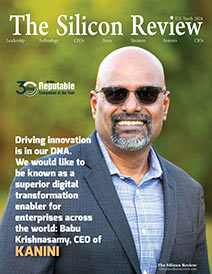Eureka Therapeutics Attacking Cancer’s Achilles Heel
The Silicon Review
![]() Cheng Liu’s mother and father were both doctors and they did not shelter him from the suffering of the patients they treated. They talked about their work and the whole family lived in a home next to the hospital.
Cheng Liu’s mother and father were both doctors and they did not shelter him from the suffering of the patients they treated. They talked about their work and the whole family lived in a home next to the hospital.
“I saw life and death every day,” Liu said. The memory of that never left him. Cancer, he could see, was medicine’s toughest enemy, one that kills almost 8 million people worldwide each year. Liu believed science could do much better—to make treatment more successful and side effects less lethal.
Liu and his colleagues at Emeryville-based Eureka Therapeutics think they have cracked the immune system’s code to accomplish both of those goals.
Chimeric antigen receptor T-cell (CAR-T) therapy - a class of immunotherapy in which the body’s immune system is harnessed to attack cancer cells – has achieved tremendous success in treating blood cancers such as leukemia and lymphoma. However, progress in CAR-T therapy has been limited by its toxicity and its inability to treat solid cancers, which represent 90 percent of cancer diagnoses.
This year, after great success in laboratory tests, Eureka Therapeutics will share with patients two breakthrough solutions to those limitations.“We have high hopes,” Liu said.
Others would likely say the same thing. The results of Eureka’s pre-clinical work published last year in peer-reviewed journals were so promising and aroused so much immediate interest that Liu, Eureka’s founder and CEO, was quickly invited to speak at two major conferences of experts in the manipulation of the human immune system to definitively treat cancer with minium side effects.
What Eureka has done is a one-two punch against cancer. First, it engineered a cancer-targeting antibody from the immune system that can see the disease no matter how it disguises itself on the outside.Cancer cells mutate and develop a resistance to traditional therapies that work only against markers on the cell surface. “Bad guys can dress up in different clothes,” Liu said, “but the intracellular changes that drive cancer’s growth don’t change. We’ve found a way to see those drivers and to design an antibody to attack them.”
Eureka’s research is the necessary step beyond the 20th century’s big cancer treatment milestone – engaging antibodies, the first line of defense the immune system can deploy. Scientists had already learned to corral antibodies against cancer by flagging the proteins detectable on the outside of its cells. Eureka’s scientists instead looked inside cancer cells’ crucial interior proteins – the unchanging ones. They focused on liver cancer, a disease that affects 700,000 people each year worldwide. It is so lethal and untreatable that it claims 80 percent of its victims in the first year after diagnosis.
Eureka’s scientists found a protein produced specifically within liver cancer cells and developed an antibody, which, aided by the immune system, could target that protein and destroy the liver cancer cell. They engineered this antibody into the immune system’s best attack mechanism—T cells—manipulating the immune system to go after the cancer.
“It’s a way to take advantage of the immune system,” Liu said. “It works against new cancer cells every day, but people get cancer when that system goes down. What we’re doing is booting it back up.”
Eureka’s creation—called ET1402LI—has performed so well in laboratory trials that it will begin its clinical trials this year. If it works, the technique can be applied to other solid cancers like prostate cancer.
Liu and his team also wanted to protect cancer patients against cytokine release syndrome (CRS), a side effect of current CAR-T therapy that affects up to 40 percent of patients. CRS can be so toxic that several patient deaths have been reported in clinical trials.
Eureka reengineered the T-cell to stop the overproduction of cytokines. Named Artemis by Eureka’s scientists, the Artemis T-cell platformhas been shown to have the same cancer-killing power as conventional CAR-T while avoiding the toxicity associated with CRS. Clinical trials for Artemis will also begin later this year.
For Eureka and Liu, these discoveries and accomplishments are a natural progression: He founded Eureka in 2006 after serving as principal scientist at Chiron, now Novartis, for an antibody designed to treat cancer metastasized into the bones. He holds multiple U.S. patents for drug discoveries. In the last two years, Eureka’s work has been validated by six papers published in prestigious peer-reviewed journals, including Clinical Cancer Research, Nature Biotechnology, Science Translational Medicine, Blood, Leukemia, and The Journal of Molecular Biology.
Eureka has remained small – it has just 34 employees in its Emeryville-based headquarters; 22 of those are researchers with PhDs.Their persistence is mighty, their dedication mirroring Liu’s own.
“I believe everything can be done,” Liu said. “Our job is the technology of antibody discovery and engineering – and we have the spirit to do something other people say cannot be done. We are learning from the immune system, from what nature does, to cure cancer.”
Meet the Founder
Dr. Cheng Liu is the founder and CEO of Eureka Therapeutics, a California biotech company dedicated to antibody research and discovery for cancer immunotherapy.
Dr. Liu received his B.S. in Cell Biology and Genetics from Beijing University and a Ph.D. in Molecular Cell Biology from the University of California, Berkeley. Prior to founding Eureka, Dr. Liu was a Principal Scientist in antibody drug discovery at Chiron (now Novartis), where he championed anti-CSF1 antibody program for treatment of bone metastasis to human clinical trials. He is the inventor of multiple issued US patents in drug discovery. In 2007, he was awarded Special US Congressional Recognition for his contributions to improving human health.









